We have all heard about cats purring and letting out a sweet rasp because they are happy and content. But what if they are in pain? Do cats purr when they are sick?
To put it simply, yes, cats do purr when they are sick or in anguish. Purring is basically a communication mechanism for kittens, and they purr to convey each and every one of their emotions, whether joy or sadness.
If you see your cat purring at any point in time, look for additional cues in her body language to determine whether what she is feeling is true happiness.
Key Takeaways
- Cats purr to communicate all sorts of emotions, including joy, sadness, fear, stress, and pain
- Cats purr when they are sick or in pain as a way to seek attention, and also to heal themselves
- The vibrational frequencies at which cats purr (between 25Hz and 150Hz) have healing properties and are used in therapies for humans.
- Cats release endorphins when they purr, which increases happiness in humans and alleviates pain.
- Purring may also help cats maintain muscle tone and bone density.
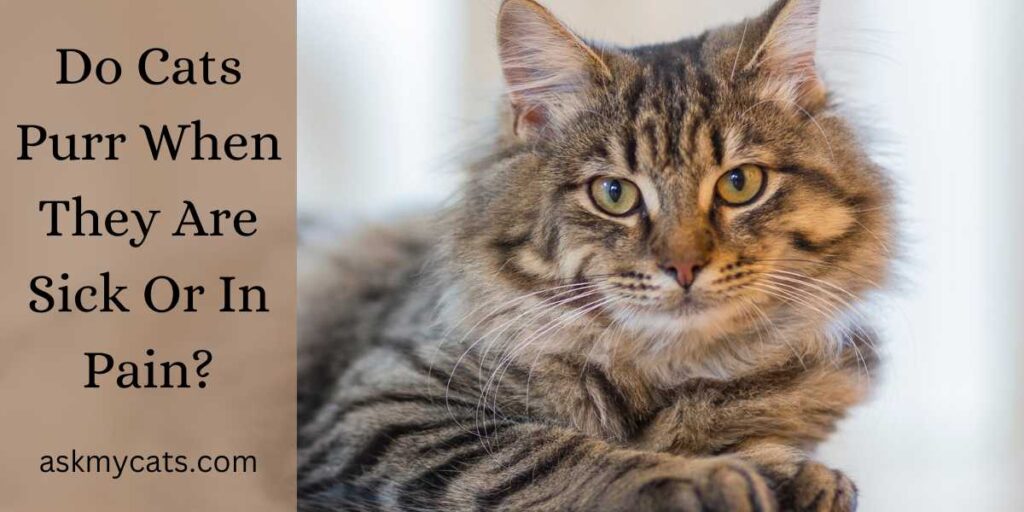

Give Your Cat the Perfect Day
Get the Free Ebook!
Do Cats Purr When They Are Unwell?
Yes, cats do purr when they are unwell.
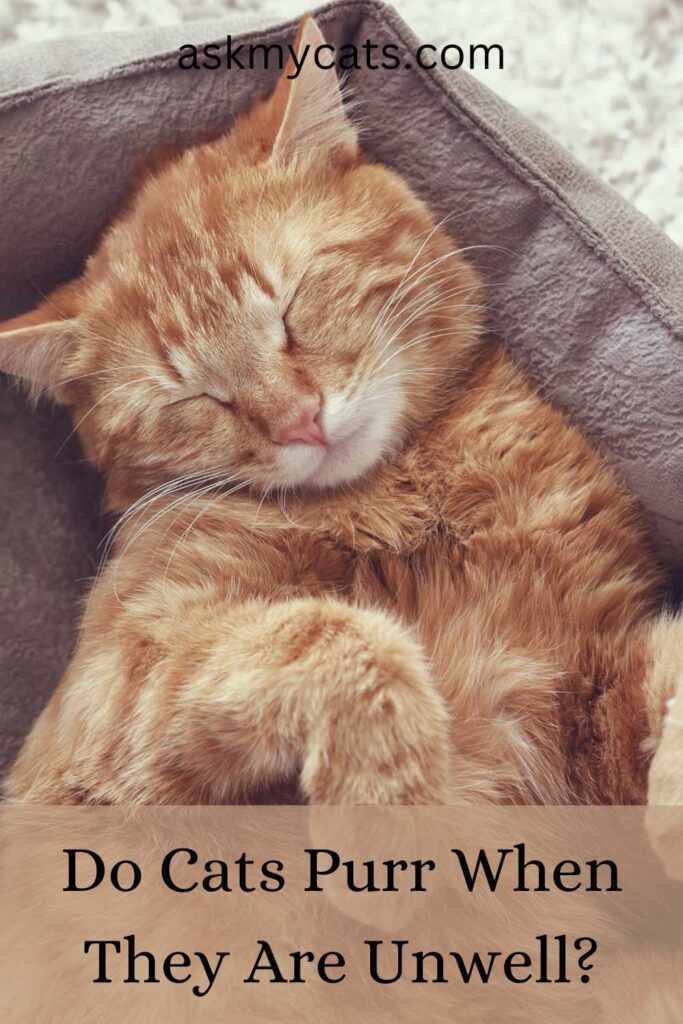
The exact mechanism through which cats purr is somewhat ambiguous. There is no specific organ or anatomical feature that is responsible for purring in cats.
However, the consensus supports that when the glottis i.e the muscles in the larynx rapidly dilate and constrict, it causes vibrations in the air during inhalation and exhalation, thus causing the purring sound.
Kittens start purring when they are just a few days old. During this time, kittens don’t yet develop the skill of meowing, therefore they use purring to communicate with their mother and siblings. They do this to catch their mother’s attention for nursing.
This purring mechanism is carried by cats well into their adulthood. As they grow older, cats use purring to convey their needs to their human carers.
A cat’s purring is most noticeable when she is expressing her joy at being stroked, or petted by her owner. Because of this, it is assumed that cats only purr to convey happiness and satisfaction.
However, in actuality, cats purr to convey all sorts of feelings which include the negative emotions of fear, apprehension, stress, anger, etc. as well.
As Tony Buffington, a cat expert and veterinarian at Ohio University rightly says “It’s naive to think that cats can only purr for one reason—it’s like thinking that people can only laugh for one reason.”
Tony Buffington, a cat expert and veterinarian
When your cat is unwell, she will purr gently to let you know that she is feeling sick and needs some extra attention. Cats also purr when they are unwell to heal themselves because cat purring has healing properties.
Interesting Read: Do Older Cats Purr More or Less?
Do Cats Purr When They Are In Pain?
As we established before, cats purr for all sorts of reasons. Cats do purr when they are in pain. Purring is a very special mechanism that promotes healing in cats.
The vibrational frequencies at which cats purr are used by healers all around the world to heal human maladies.
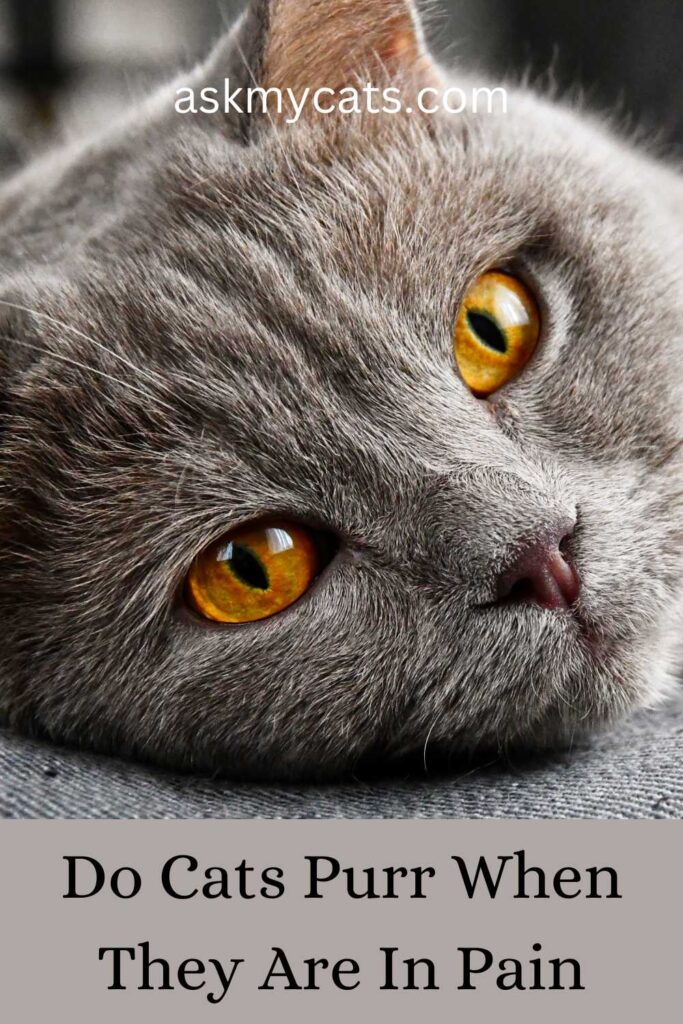
Cats purr at rhythmic frequencies between 25Hz and 150Hz. They do this during both inhalation and exhalation.
Frequencies ranging from 20Hz – 150Hz are believed to promote bone growth and those between 25-100Hz correspond with healing frequencies used in therapies for humans.
Domestic cats purr at 26 Hz which promotes tissue regeneration.
Some vets and cat owners have observed cats lying next to each other and purring at the injured one. This phenomenon is called pet therapy.
When cats purr, they release certain chemicals called ‘endorphins’ which increase happiness in humans and alleviate pain. Cats not only purr to heal us, but they also purr to heal themselves and mollify their own pain.
The longevity of a cat’s life has been often related to the fact that cats have adapted to an energy-conservation lifestyle wherein they preserve and generate their energy through extended periods of rest and sleep. Purring, therefore, is a low-energy mechanism that also actively stimulates their bones and muscles.
“Purring is therapeutic for the cats themselves,” says Lee Zasloff, a zoologist who studies the relationships between people and animals. “It’s believed that the purr helps them to retain their muscle tone and bone density.”
Lee Zasloff, a zoologist
Interesting Read: Why Do Cats Purr When They Are Dying?
Common Health Conditions That Can Cause Cats to Purr When They Are In Pain
| Health Condition | Description |
|---|---|
| Dental problems | Cats may purr when they are experiencing pain due to dental issues such as tooth decay or abscesses. |
| Respiratory infection | Cats may purr when they are experiencing discomfort due to a respiratory infection such as a cold or pneumonia. |
| Gastrointestinal problems | Cats may purr when they are experiencing abdominal pain or discomfort due to gastrointestinal issues such as constipation or inflammatory bowel disease. |
| Musculoskeletal problems | Cats may purr when they are experiencing pain due to musculoskeletal issues such as arthritis or a fracture. |
| Skin problems | Cats may purr when they are experiencing discomfort due to skin conditions such as allergies or infections. |
Is Purring A Good Sign In Sick Cats?
Yes, purring is a good sign in sick cats. It means that they are actively healing themselves.
When cats purr, they release a hormone called endorphin in their blood vessels. This chemical is a happy hormone that makes one feel social, joyous, and excited.
Endorphin is also the hormone that is released within us after physical exercise.
Research has found out that cats do not only release endorphins in their own body, but it also permeates humans.
The catch here is the purring sound. For decades healers have believed that certain vibrational sounds promote mental and physical healing in humans. Studies have depicted that a cat also purrs at the same frequencies that the healers have been using.
According to Mom.com “Recent research has shown that the soothing sounds of a kitty can aid your body in a number of ways, greatly counteracting any heartache that comes from your cat ignoring you. Cats are able to heal because their purrs fluctuate between 20 to 140 Hz, a frequency range that has been proven to be medically therapeutic.”
Mom.com
Cats often lie next to each other and purr to heal themselves. Thus, if your sick cat is purring, it means that she is healing herself, without you having to do anything. Isn’t that amazing?!
Interesting Read: Do Cats Purr When Stressed?
How To Tell If A Cat Is Purring In Pain?
You know your cat better than most. Cta owners are often the first to recognize signs of discomfort in their cats.
If you are aware of your cat’s normal behavior – her sleep patterns, food consumption, litter box patterns, etc., then chances are that you will easily be able to recognize if your cat is in pain.
1. Biting and Scratching
Cats in pain are likely to bite and scratch more than they usually do. This will be especially true if you touch them in the place where are hurting or in pain. Cats in pain are also more irritable and crabby.
2. Breathing Changes
Cats breathe faster or pant when they are unwell or experiencing discomfort.
According to preventive vet
“Count your cat’s breaths for 15 seconds when they’re asleep (at rest), then multiply it by 4 to get the number of breaths per minute. You can use the timer on your phone and place your hand on their chest to feel their breaths as you count. Or watch their chest rise and fall = 1 breath.
The normal rate for cats is between 12 and 60 breaths a minute. Make sure your cat is not sniffing, awake, or moving around when you’re trying to count, as this will lead to inaccurate counts.”
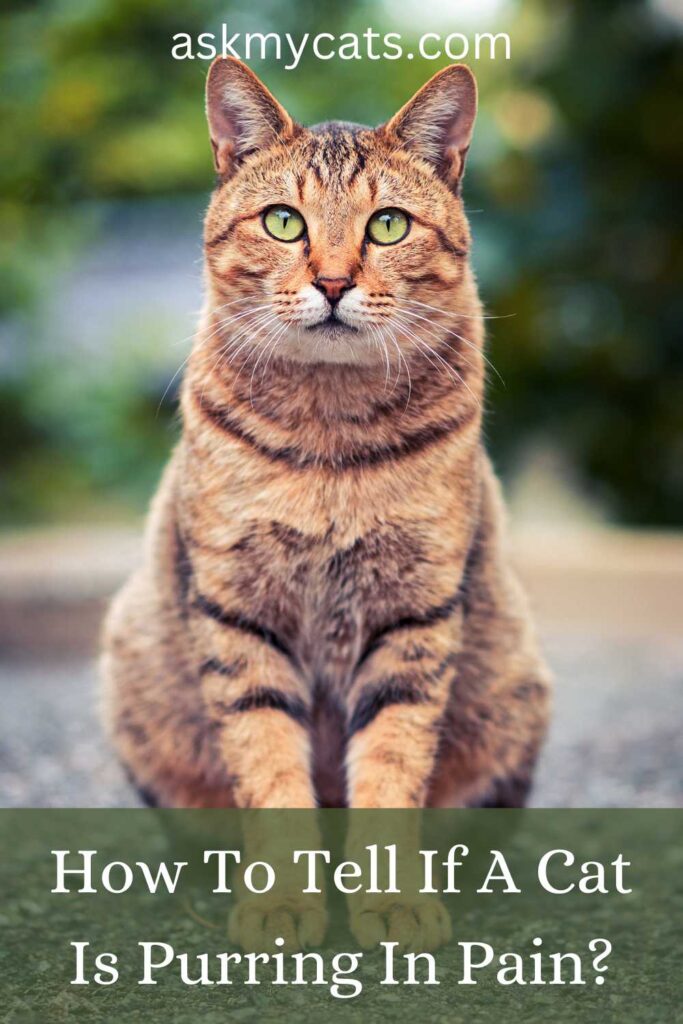
3. Eye Changes
The eyes are arguably one of the most expressive arts of the body. When you look into your cat’s eyes, you’ll be able to infer if she is sick or unwell.
Pain anywhere in the body can cause dilated pupils whereas pain in the eyes itself can cause either dilated or constricted pupils.
4. Changes In Eating or Drinking Patterns
When a cat is unwell, there are discernible changes in her eating patterns. When we get sick, we tend to eat and drink less. This is the same for cats. If your cat is sick, you will find her appetite to be lost and restricted.
Thus, if your cat is purring in pain, then you will see the signs listed above.
Interesting Read: Why Do Cats Purr When You Stroke/Pet Them?
Signs that a Cat May be in Pain or Illness
| Sign | Description |
|---|---|
| Change in behavior | Cats in pain or illness may become more lethargic or inactive or may exhibit changes in appetite or sleep patterns. |
| Change in vocalization | Cats in pain or illness may meow more frequently or differently than usual. |
| Change in appearance | Cats in pain or illness may have changes in their coat or skin, such as excessive shedding or dry, flaky skin. They may also have visible swelling or redness. |
| Change in body language | Cats in pain or illness may adopt a hunched posture, avoid being touched, or display signs of anxiety or aggression. |
Differences Between a Cat’s Normal Purr And a Distressed or Sick Purr
Important Note:
It’s important to note that these are just general guidelines, and individual cats may vary in their purring behavior.
If you notice any changes in your cat’s purring behavior, it’s always a good idea to pay attention and observe your cat closely to see if there are any other signs of distress or illness.
If you are concerned about your cat’s health, it’s always best to consult with a veterinarian.
| Characteristic | Normal Purr | Distressed/Sick Purr |
|---|---|---|
| Frequency | Low | High |
| Volume | Moderate | Loud or soft |
| Duration | Continuous or intermittent | Long or intermittent |
| Tone | Even | Irregular |
| Rhythm | Regular | Irregular |
| Intensity | Moderate | Strong or weak |
| Context | Relaxed or content | Distressed or seeking attention/comfort |
What To Do If Your Cat Is Purring In Pain?
Well, if you suspect that your cat is severely ill, then the first order of action would be to take her to the vet. The vet will have a better idea of how to alleviate a sick cat’s pain.
You can also provide some immediate pain relief to your cat by yourself.
According to PetMD “When treating pain and inflammation in cats, omega fatty acids and glucosamine can be used in addition to, or in lieu of, traditional pain medications. Heat/ice, laser therapy, chiropractics, physical therapy, massage, and acupuncture can also be very helpful in treating cat pain.”
PetMD
Interesting Read: Why Does My Cat Purr When He Sees Me?
Frequently Asked Questions
Do cats only purr because they are happy?
No, cats don’t purr only because they are happy. Purring is a communication method, just like meowing is. It is true that most often the reason behind a cat’s purr is happiness. However, this is not always the case. Cats also purr to express other emotions like pain, anger, stress, etc.
Do all cats purr?
No, purring is only found in domestic and some species of wild cats. Cats that don’t purr, roar, and those that can’t roar, purr. This is because, in roaring cats, there is a small bone inside the vocal cords that is a flexible ligament. This stretchable ligament allows big cats to make a deep sound but in domestic cats, the flexibility of the ligament is replaced with a hardened bone. Therefore, all cats cannot purr.
Final Thoughts
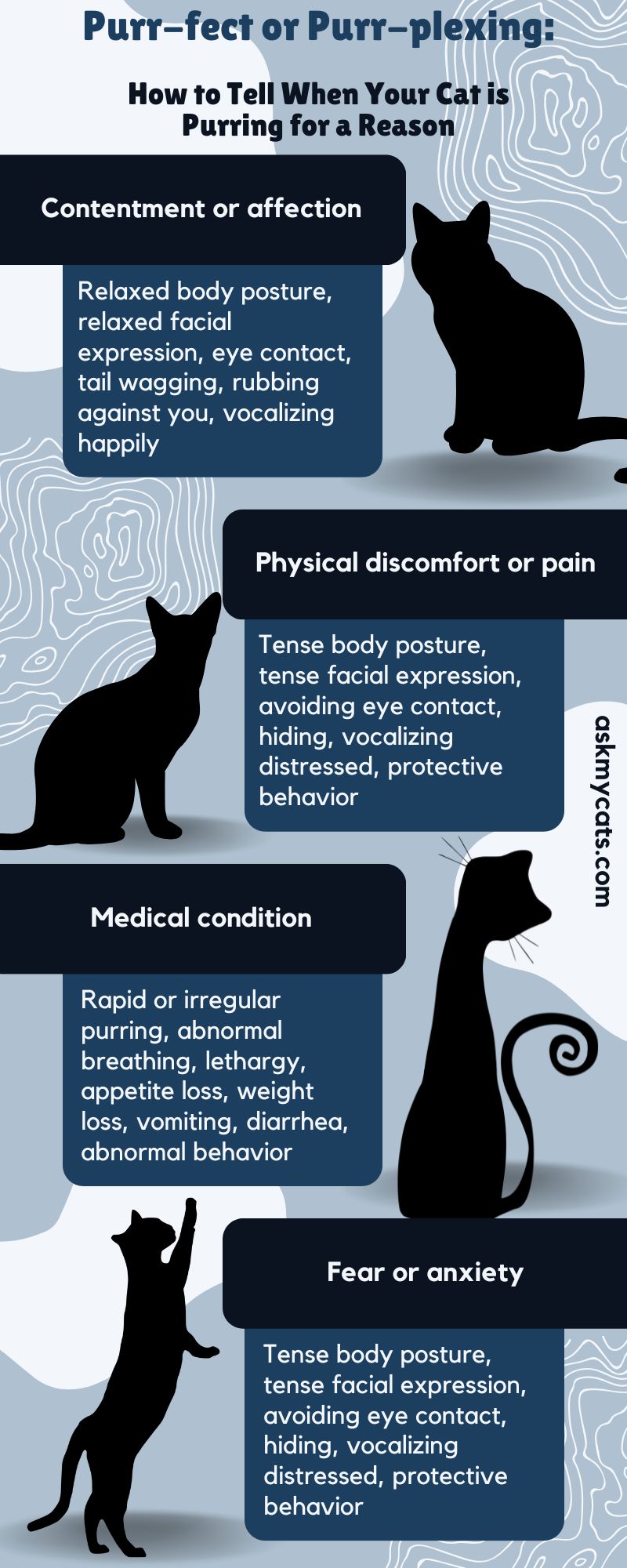
To conclude in a nutshell, cats don’t always purr just because they are happy or to convey other positive emotions. They also purr when they are feeling down, stressed, anxious, or apprehensive.
It takes a keen eye to recognize whether your cat is purring because she is satisfied or because she is in pain.
When your cat is purring because of pain, she will display other related emotions like biting, scratching, elevated heart rate, irritated mood, etc.
This will help you to discern your cat’s feelings. You must take your furry friend to a vet if you suspect that the reason behind her purr is, in fact, pain.
Some of the Interesting reads regarding cat purring:
- Why Do Cats Purr? The Science of Cat Purring
- Why Doesn’t My Cat Purr?
- How To Make A Cat Purr?
- Cat Purring Effect On Humans: The Power of Cat Purring
- Do Cats Purr When They Sleep?
- Why Is My Cat Purring So Much?
- Why Does My Cat Purr So Loudly?
- Can Cats Control Their Purring?
- Do Cats Breathe Faster When Purring?
- Why Do Cats Wag Their Tails While Purring?
- How To Purr Like A Cat?
- Why Does My Cat’s Purring Sound Congested?
- Why Do Cats Purr When You Talk To Them?
- Why Is My Pregnant Cat Purring So Much?
- Why Do Cats Purr And Knead?
- Do Cats Purr When They Are Happy?
- Why Does My Cat Lay On Me And Purr?
- Why Do Cat’s Noses Get Wet When They Purr?
- Why Does My Cat Drool When He Purrs?
- Why Does My Cat Purr And Bite Me?
- Do Feral Cats Purr?
- Differences In Purring Between Cat Breeds
